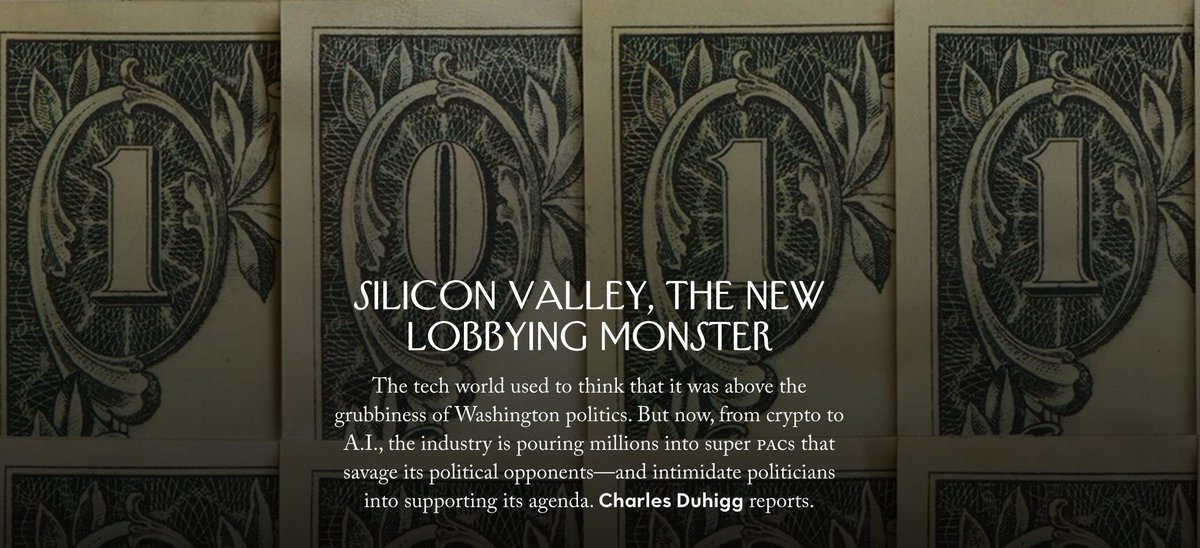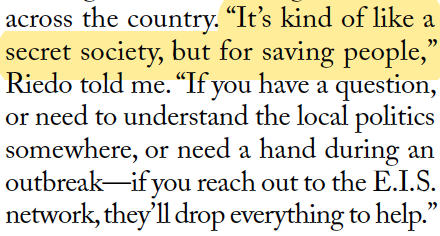For the past six months, I’ve been trying to figure out why the tech industry – and in particular crypto – have been pouring so much money into political races.
The answer is bigger, and much more wide-ranging, than we think, and it appears in the New Yorker today.
newyorker.com/magazine/2024/…
The answer is bigger, and much more wide-ranging, than we think, and it appears in the New Yorker today.
newyorker.com/magazine/2024/…

As the story explains, this is:
“the culmination of a strategy that had begun more than a decade earlier to turn Silicon Valley into the most powerful political operation in the nation. … It is likely that in the coming decades these efforts will affect everything from Presidential races to which party controls Congress and how antitrust and artificial intelligence are regulated.”
“the culmination of a strategy that had begun more than a decade earlier to turn Silicon Valley into the most powerful political operation in the nation. … It is likely that in the coming decades these efforts will affect everything from Presidential races to which party controls Congress and how antitrust and artificial intelligence are regulated.”

You can see the impact of Silicon Valley’s power in the Senate race in California, where Katie Porter’s campaign was blown up – almost overnight – when a SuperPAC named Fairshake decided to spent $10 million attacking her.
axios.com/2024/02/28/fai…
axios.com/2024/02/28/fai…
Fairshake, which was backed by three major crypto investors/companies, didn’t really care about Porter, rather:
“the person familiar with Fairshake said, the goal of the attack campaign was to terrify other politicians … to draw attention to Silicon Valley’s financial might—and to prove that its leaders are capable of political savagery in order to protect their interests.”
“the person familiar with Fairshake said, the goal of the attack campaign was to terrify other politicians … to draw attention to Silicon Valley’s financial might—and to prove that its leaders are capable of political savagery in order to protect their interests.”

And it worked. Candidates around the country have begun supporting crypto initiatives. In fact
“In May, two months after Porter’s defenestration, a pro-crypto bill came up for a vote in the House. In previous years, similar bills had languished … The new bill sailed through the House, with nearly unanimous Republican backing and seventy-one votes from Democrats.”
coindesk.com/policy/2024/05…
“In May, two months after Porter’s defenestration, a pro-crypto bill came up for a vote in the House. In previous years, similar bills had languished … The new bill sailed through the House, with nearly unanimous Republican backing and seventy-one votes from Democrats.”
coindesk.com/policy/2024/05…
At the core of this effort is a handful of political consultants who have transformed Silicon Valley. Foremost among them is Chris Lehane, who worked in the Clinton White House before going to Airbnb, where he taught the company to woo and bully politicians. 

and then helped Coinbase set up Fairshake, which has quietly become one of the largest SuperPACs – on par with oil and gas, pharma and labor.
axios.com/2024/08/22/cry…
axios.com/2024/08/22/cry…
And now he’s at OpenAI, where the battle over how artificial intelligence is regulated is about to become very political. 

The end product is that:
"Now that the tech industry has quietly become one of the most powerful lobbying forces in American politics, it is wielding that power as previous corporate special interests have: to bully, cajole, and remake the nation as it sees fit."
"Now that the tech industry has quietly become one of the most powerful lobbying forces in American politics, it is wielding that power as previous corporate special interests have: to bully, cajole, and remake the nation as it sees fit."

I hope you get a chance to read the article:
newyorker.com/magazine/2024/…
newyorker.com/magazine/2024/…
And, I should add, this work is due to all my wonderful colleagues @NewYorker, including Alex Brady, Jane Bua and the great Daniel Zalewski.
• • •
Missing some Tweet in this thread? You can try to
force a refresh





